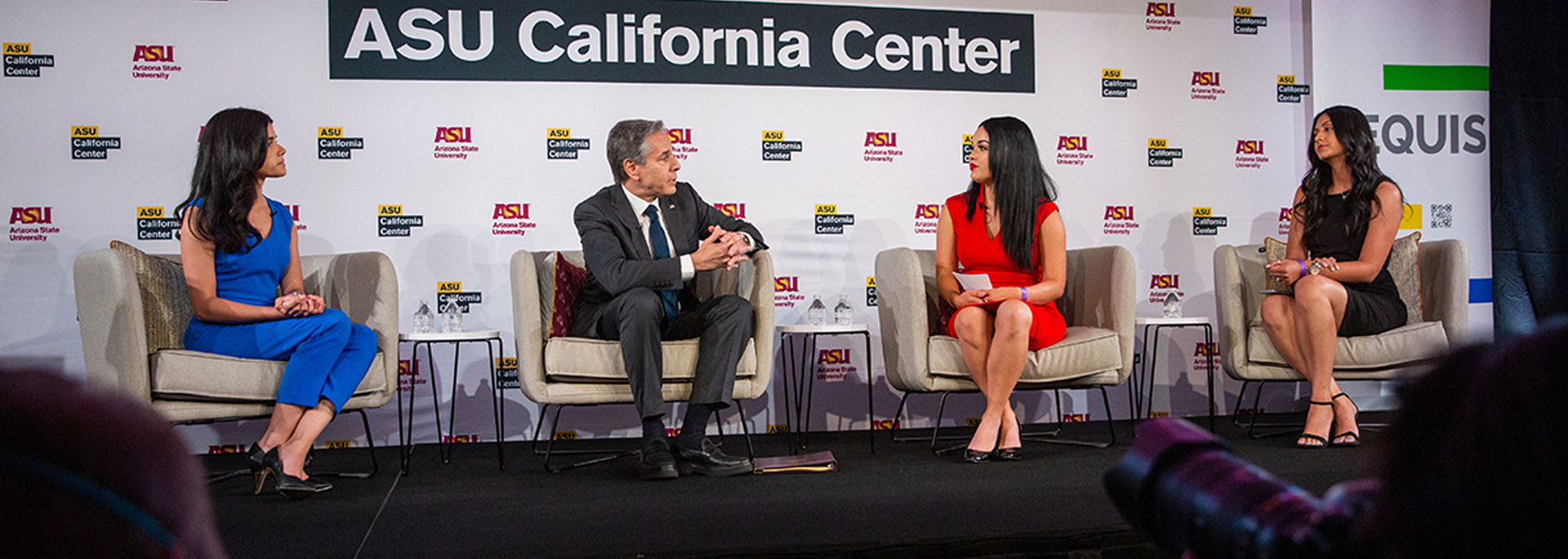
Cronkite students, alumna reflect on opportunity to lead Media Summit of the Americas panel with Secretary Blinken
It's not everyday you get to sit down and speak with the U.S. Secretary of State and discuss media sustainability in an ever changing journalistic world. However, for Cronkite students Madison Thomas, Andrea Villalobos and recent alumna Marcella Baietto, they were given the opportunity to do just that at the first ever Media Summit of the Americas.
The Media Summit of the Americas is a newly established conference organized by the Cronkite School, Equis Research Labs and the U.S. Department of State, which is part of the Ninth Summit of Americas. The Media Summit set out to address the issue of misinformation in the journalism world, specifically in the northern hemisphere. This year, U.S. Secretary of State Antony J. Blinken attended and spoke with Cronkite students at the ASU California Center at the historic Herald Examiner Building in Los Angeles.
"I was honestly a little bit in shock because my time in Cronkite News had ended, so I felt that I had closed that chapter," Villalobos said, referring to her unexpected invitation.
Thomas and Villalobos were invited to speak at the event by Cronkite News Managing Editor and Executive Producer Heather Dunn. When speaking about their invitation to the event, both of them were taken aback by the opportunity to do such a thing, since neither of them expected to be invited.
Thomas said that she jumped at the opportunity but then realized she didn't know much about the event prior to participating. She researched the summit as well as Secretary Blinken to learn and prepare for what was to come. During her preparation, it struck her just how important this was for her journalistic career.
"I had to be ready to give responses and have this conversation with someone who is fourth in line to be president, so that's when the nerves really set in and I realized just how big of a deal this really is," Thomas said.
Baietto, who graduated in 2020, was busy looking for an apartment for her new job in Philadelphia when she was asked to attend.
"I got an email saying "'hey, do you want to do this?' and I'm like of course I wanted to do this. So it was totally off the cuff and there wasn't a lot of preparation but I'm just so excited that it really did work out," Baietto said.
Thomas, Villalobos and Baietto had 45 minutes to lead the conversation with Secretary Blinken. While onstage members of the audience asked questions, something that Thomas said was unplanned for the event.
"I didn't know what to do at that moment, internally I was panicking. But you know they were important questions that they were asking," Thomas said.
Once the panelists overcame that hurdle, they were able to start their discussion of media sustainability, misinformation and mistrust in the media. All three reflected on their conversation and the importance of the topic.
"I feel like we were able to bring up good points and provide our perspective on things. Hopefully, people take something away from that and Secretary Blinken," Thomas said. "Obviously our experience as journalists is very different than someone else who has been practicing for 40 years, but I think it is important to listen to people that are younger and just starting out. We have a different perspective on things."
"It's crazy to think about now because we are so young, but 20 to 30 years from now, we are going to be the ones on these stages as the speakers telling our stories from back when we first started and what it was like. Hopefully by that time, when we have 20 to 30 years under our belt, I hope by that time we've made a change" Villalobos added.
"In order to make sure we're combating misinformation and really thinking about the future of journalism, we really have to start first with these important conversations," Baietto said. "It was incredibly eye-opening, I don't look at it like "'wow, this is such an accomplishment.' It wasn't so much that as it was more of it really reinvigorated and made me realize again why I do this and why so many of us do this."
Learn more about the Media Summit of the Americas and watch the sessions.
About the Cronkite School
The Walter Cronkite School of Journalism and Mass Communication at Arizona State University is widely recognized as one of the nation's premier professional journalism programs and has received international acclaim for its innovative use of the "teaching hospital" model. Rooted in the time-honored values that characterize its namesake — accuracy, responsibility, objectivity, integrity — the school fosters journalistic excellence and ethics in both the classroom and in its 13 professional programs that fully immerse students in the practice of journalism and related fields. Arizona PBS, one of the nation's largest public television stations, is part of Cronkite, making it the largest media outlet operated by a journalism school in the world. Learn more at cronkite.asu.edu.